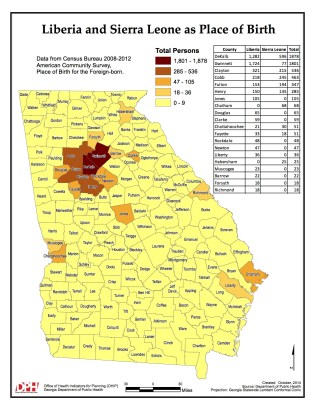About 90 percent of Georgia residents who were born in two Ebola-ravaged West African nations live in six metro Atlanta counties, a map produced by public health officials shows.
That map, along with one charting refugees from Liberia and Sierra Leone, was created by the Department of Public Health to help its “outreach and educational efforts” on Ebola, said DPH spokesman Ryan Deal.
“This is especially important as the holidays approach, giving rise to increased travel as families unite,’’ Deal said in an email to GHN.
The agency did not calculate the numbers of people living in Georgia from Guinea, the third West African country devastated by the current outbreak of the disease.
Meanwhile on Monday, Gov. Nathan Deal announced new, tougher monitoring measures for people who have come into contact with Ebola patients in Africa. Some travelers would be subject to quarantine under the new policy even if they showed no symptoms of the disease.
Broad quarantines are being implemented elsewhere. New Jersey and New York introduced strict regulations last week, followed quickly by Illinois. The regulations apply to aid workers operating in West Africa, regardless of whether they have shown symptoms of the deadly virus.
(Click map to enlarge)
Since the summer, much Ebola-related activity has occurred in Atlanta and Georgia. The CDC has more than 100 workers in the three West African nations and operates a special SWAT-like team to respond to new infections in the United States.
Emory University Hospital in Atlanta has treated four Ebola patients, and soldiers from three Georgia military posts — Fort Stewart, Fort Gordon and Fort Benning — are being sent to West Africa to help with logistical support.
Thousands of West Africans
Public Health’s map on people born in Sierra Leone and Liberia shows almost 6,000 living in Georgia. Of those, 3,679 live in DeKalb and Gwinnett counties combined. Clayton County has 536, followed by Cobb with 463, Fulton with 347 and Henry with 285. All these counties are in metropolitan Atlanta.
Other Georgia counties with more than 50 total are Jones, Chatham, Douglas, Clarke, Chattahoochee and Fayette. (Douglas and Fayette counties are in metro Atlanta.)
A nationally known epidemiologist, visiting Atlanta for a lecture Monday at Georgia State University, told GHN that the state’s mapping effort “doesn’t strike me as unreasonable.”
These people “are likelier to have contact with people in Liberia,’’ said Dr. Sandro Galea, chairman of the Department of Epidemiology at Columbia University’s Mailman School of Public Health.
But Galea said going beyond public health education would not make sense. There is a responsibility for public health workers, he said, “not to stir up fears’’ and not to compromise “core rights and dignity of individuals.”
“Often forgotten is that the vast majority of people in Liberia and Sierra Leone don’t have Ebola,” Galea added.
Public Health spokesman Deal (no relation to the governor) said that “because the Ebola outbreak is centered in West Africa, having an awareness of those areas in Georgia with larger populations of those born in West Africa can provide the department with important knowledge, which helps to better guide our outreach and educational efforts.”
Levels of risk
Under Georgia’s new monitoring policy, travelers from West Africa who show no symptoms will be placed in one of three categories:
Category 1, high risk – Travelers with known direct exposure to an Ebola patient. Travelers in this category will be subject to quarantine at a designated facility.
Category 2, low risk – Travelers from affected area with no known exposure to an Ebola patient. Travelers in this category will sign a monitoring agreement with the Georgia Department of Public Health. This agreement requires travelers to conduct temperature and symptom self-checks twice per day and report results to Public Health once per day (electronic, email or phone contact acceptable). Travelers who fail to report during the 21-day incubation period will be contacted by Public Health and issued a mandatory quarantine order if necessary.
Category 3 – Medical personnel actively involved in treating Ebola patients returning to the United States. Individuals in this category will be issued a 21-day active monitoring order and will be visually monitored (video communications or home visit) by Public Health twice per day. Public Health will assess for the development of symptoms and adjust restrictions as necessary. Noncompliance will result in quarantine at a state-designated facility.
Last week, Public Health Commissioner Dr. Brenda Fitzgerald said public health officials are monitoring 20 travelers who have arrived in the state recently from countries affected by the Ebola epidemic. These travelers are not being held in isolation but are required to report their temperature and any other Ebola symptoms daily to state health or local officials.
Criticism of quarantine
Galea of Columbia University told GHN that a rigid quarantine as New Jersey outlined is a “tremendous disincentive’’ to health care workers.
If Georgia enacted such restrictions, that would have a damaging effect on a substantial part of CDC’s workforce, he said. “It’s impractical, unfeasible and not necessary.”
New Jersey officials on Monday released a nurse they had kept quarantined in a tent since her return from treating Ebola patients in Sierra Leone.
The nurse, Kaci Hickox, 33, who had previously been working with the group Doctors Without Borders, became the first public test case for a mandatory quarantine that New Jersey Gov. Chris Christie, a Republican, and New York Gov. Andrew Cuomo announced Friday. Christie has defended the policy in New Jersey, but Cuomo said Sunday night that the quarantine in New York would be made voluntary rather than mandatory.
Concerns over Ebola in the New York-New Jersey area surged last week when an American doctor who had recently returned from West Africa was diagnosed with the disease in New York City.
The CDC released revised monitoring guidelines for travelers that said six states (New York, Pennsylvania, Maryland, Virginia, New Jersey and Georgia), where approximately 70 percent of incoming travelers are headed, will start active monitoring Monday, with the remainder of the states starting in the days following.
“In addition, the guidance recommends public health authorities determine on an individualized case-by-case basis whether additional restrictions, such as controlled movement, workplace exclusions, or restrictions on other activities, are appropriate.
This daily health consultation will give additional confidence to the community that a returning health care worker is asymptomatic and therefore not contagious.”
“Returning health care workers should be treated with dignity and respect,’’ the CDC announcement said. “We must not prevent or unduly discourage them from undertaking this indispensable and selfless work.”



